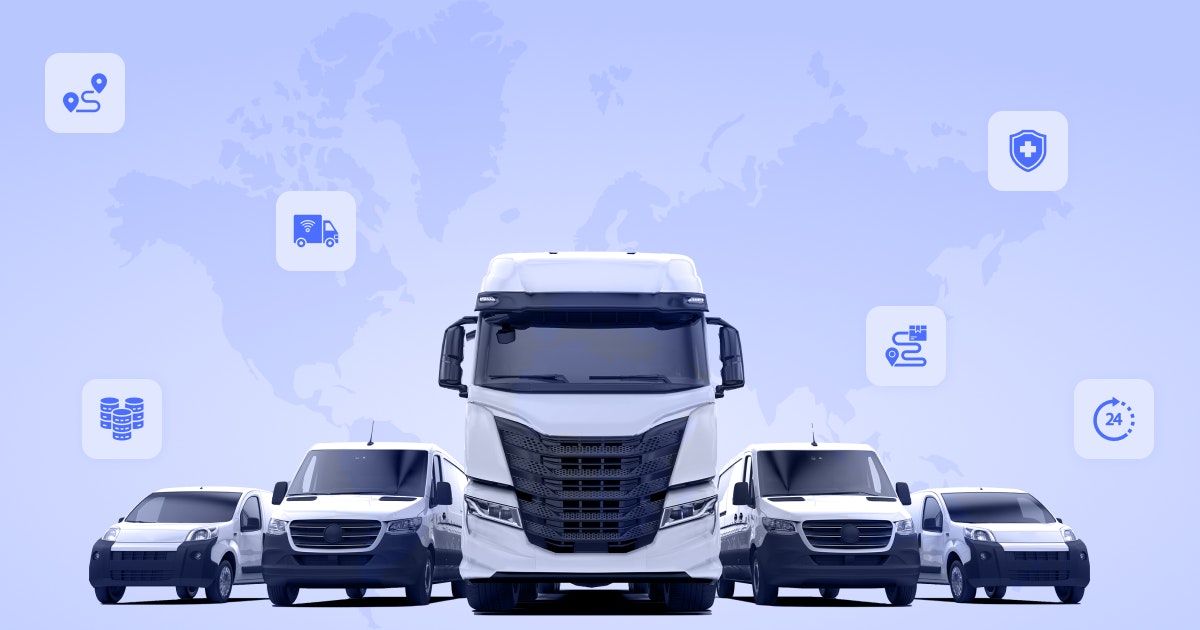Table of Content
Whether your business owns a massive fleet or just a handful of vehicles, monitoring and managing them is a tedious and time-consuming job. And it can turn into a real headache when your business operations and assets expand!
Thankfully, IoT-enabled fleet management solutions empower you with valuable real-time insights to streamline complicated business operations. Additionally, an efficiently managed fleet can boost performance, ensure vehicle and driver safety, and even comply with regulatory laws.
What is Fleet Management?
Fleet management is an umbrella term that refers to a series of processes involved in monitoring, managing, and optimizing a caravan of commercial vehicles and associated assets.
A well-managed fleet is crucial to boost profitability, yield fuel savings, manage vehicle maintenance, track fleet movement, and lower the overheads. Here are some of the benefits of fleet management:
- Enhanced asset utilization
- Improved customer servicing and satisfaction
- Manage safety compliance
- Route optimization for reduced fuel consumption
- Reduced downtime
While every business with a considerable size of commercial vehicles needs fleet management, the following industries can benefit from a smartly monitored and organized fleet:
- Freight services
- Oil, gas, and mining companies
- Food delivery
- Emergency services
- Utility companies
- Construction
- Landscaping
- Public transportation
- Courier and package delivery services
- Carpooling and taxi services
Navigating the Road Ahead: IoT-Enabled Fleet Management Solutions
Innovations in the Industrial Internet of Things (IIoT) have triggered a revolution in the fleet management industry.
According to Market Research, the global IoT fleet management size will expand at a CAGR of 21.2% with a valuation of $265 million by 2027.
Fleets - large or small - generate and amass a massive amount of data daily. Analyzing complex information such as engine status, vehicle speed, location, expected routes, and ETAs is extremely cumbersome, making it susceptible to errors.
The IoT-enabled fleet management system gathers large and complicated data and funnels it down to provide predictive analytics, real-time feedback, and data-driven insights, making fleet management quicker, smarter, and more seamless.
Besides, smart fleet management helps your business to optimize fleet utilization, drive tangible results, and achieve business goals.
What’s more, IoT technologies offer data transparency and valuable business insights via a centralized dashboard and enable better decision-making.
Smart fleet solutions help to reduce overheads related to fuel efficiency and maintenance schedules while increasing the overall productivity of the fleets.
Transform Your Fleet Management with Smart IoT Solutions!
Let's Get StartedWhat are the Common Hurdles in Conventional Fleet Management?
Fleet management is evolving at the speed of light, making it difficult for fleet managers to organize their priorities, leading to mismanagement and chaos. This eventually affects the revenues and operational productivity.
Here, we have listed some of the common hurdles in conventional fleet management:
The Dearth of Real-Time Data
A fleet - large or small - generates a huge quantity of disparate data such as live location, fuel usage, and routes, making it difficult to manage the entire fleet.
Moreover, organizing such massive data and turning it into actionable insights can hinder the decision-making process and directly impact a business’s revenue.
What’s more, information overload makes it difficult to scan through and pull out relevant insights about the fleet’s performance and upcoming maintenance schedule.
Without transparent data, identifying potential issues and disruptions becomes challenging. Consequently, all these factors add to the operational overheads and affect the bottom lines.
Monitoring and Managing Vehicle Maintenance
Regular maintenance of the fleet is important to increase their life span and cut down on fuel costs.
However, keeping a record of each vehicle’s maintenance schedule can result in accelerated wear and tear, ultimately causing frequent breakdowns and loss of productive hours.
Ignoring even minor service issues can increase repair and replacement costs down the road. For example, not checking oil levels can cause friction in the internal combustion engine, causing the machine parts to rust quickly. This can build up the repair costs.
Unsystematic Route Planning
Inefficient route planning is one of the major challenges faced by fleet owners and managers. Manually identifying the best route on maps is not only costly but also susceptible to errors.
Besides, accurate scaling and estimating ETA requires evaluating several factors such as potential detours, driver performance, traffic patterns, roadblocks, or cross-vehicle coordination.
Moreover, not having real-time data on traffic conditions can hamper making last-minute adjustments to the routes and can cause delays.
Unreliable Supply Chains
Building a resilient supply chain is one of the biggest challenges faced by fleet owners and managers, across the globe.
COVID-19 and subsequent lockdowns highlighted the unreliability and volatility of the global supply chains. Transportation-heavy industries faced the extreme brunt of supply chain disruption.
Moreover, manual inventory tracking, vendor management, raw material sourcing, and demand forecasting are prone to errors and discrepancies.
Such siloed data can make it difficult to get a clear picture of the supply chain trends and affect decision-making.
IoT In Supply Chain Management: 6 Benefits To Know
Explore the blogManaging and Coordinating Geographic Complexities
Whether coast-to-coast or across international borders, commercial fleets face significant logistical problems to manage.
Moreover, tracking and optimizing large and active fleets accurately isn’t always easy. For instance, maintaining uninterrupted communication for long-distance fleet make remote management difficult and causes disruption in the ETAs.
Apart from this, getting the precise location of the drivers, tracking operations, and communicating with various (active) fleets can pose a serious challenge for fleet managers.
Managing these fleet management challenges in the logistic industry amidst geographic complexity is what keeps drivers and fleets ahead of the game.
Navigating Through Fuel Costs Fluctuations
Fuel prices are notorious for being volatile. Fluctuating fuel prices make it impossible to accurately predict the entire fleet’s fuel expense for a given period of time.
Also, fleet managers often struggle with tracking fuel usage, mapping the shortest route, and drivers' behavior such as random and harsh braking and surpassing speeding limits. This results in excessive fuel consumption making it vulnerable to fraud and thefts.
Compliance and Fleet Risk Management
Safety compliance and risk management play an indispensable part in fleet management.
These aspects not only require regular monitoring but also must be documented for auditing purposes.
Moreover, it is important to ensure that a complete trail of data remains handy for every vehicle on the fleet for audits and clearing insurance claims.
The lack of data analytics makes it tough for business owners and fleet managers to remain compliant to avoid penalties and lawsuits.
How IoT-Enabled Smart Fleet Solutions Streamline Your Business Operations?
Industrial IoT solutions are revolutionizing fleet management with connected devices, sensors, and vehicles. Moreover, telematics captures raw data and turns it into valuable insights allowing fleet owners and managers for well-informed decision-making.
The below listed are the core benefits of IoT for fleet management;
Remote Fleet Monitoring
It’s not feasible to wait in the office to know the location of a vehicle or give directions to the drivers. That’s precisely why remote fleet monitoring is crucial for improved productivity.
With IoT in fleet management, fleet managers can track each fleet - irrespective of its location - from anywhere and at any time.
IoT-enabled smart fleet solutions make the optimal utilization of telematics, allowing managers and operators to track the fleet and reroute them when required.
Leveraging IoT in fleet management empowers businesses to remotely monitor the real-time location, speed, and fuel level of each vehicle through a centralized dashboard.
For example, geo-fencing tools make it easy for the business to track the live location of the fleet, and unplanned halts taken by the drivers. This data helps to reduce delays in delivery times and streamline the supply chain.
Predictive Maintenance Reports
With IoT sensors, vehicles can send automated signals and alerts when any potential maintenance issues arise.
IoT-based predictive maintenance for the fleet plays a crucial role in preventing unexpected breakdowns due to poor and irregular servicing.
With a comprehensive report on predictive maintenance, a business can oversee vehicle downtime due to unexpected emergency repairs and discover the impending problem to plan the best maintenance schedule.
For example, IoT sensors collate and analyze historical and real-time data to recognize the patterns in malfunctions and forecast when machinery parts may fail. This allows the managers to schedule maintenance eliminating unanticipated and emergency repairs or component replacement, helping businesses to save thousands of dollars annually.
Moreover, IoT sensors embedded in the vehicles send out alerts for brake inspections, oil changes, temperature fluctuations, and fluid levels.
Recording daily vehicle activity or driver behavior without being physically present inside the vehicle is almost impossible. But, not anymore!
IoT-enabled sensors can detect reckless driving, sharp braking, exceeding the pre-defined speed limits, wrong parking, non-observance of safety standards, and more.
This data can help the managers to analyze driver behavior and train them better to augment safety.
Moreover, driver behavior monitoring helps fleet managers and operators to compare the performance of each driver. This enables them to decide who can be assigned long-distance trips to deliver fragile or temperature-sensitive cargo.
Minimal Downtime for Profitable Business
Every second wasted for vehicle downtime can have a profound impact on the profit margins of your business. Also, it can affect customer service and eventually hurts the brand value.
Fortunately leveraging IoT can mitigate downtime and raise profits exponentially. IoT fleet management and telematics enable the business to extract and sift through relevant information faster and more effectively.
This offers better visibility into real-time metrics such as engine health, location, preventive maintenance history, and fuel usage. Equipped with this data, companies can determine possible malfunction, repair, or replacement reducing expensive downtime.
Better Fuel Management
Fuel prices have been touching the skies. Therefore, making the fleet fuel efficiency is important to reduce overheads and turn your business profitable.
However, monitoring fuel usage is a daunting process and prone to errors. For instance, fuel consumption usually increases during summer as the gas can vaporize quickly and even contributes to increased emissions.
Fleet owners and managers can leverage IoT sensors and telematics to calculate consumption patterns during summers and winters. This helps them to find ways to optimize fuel usage and save on unnecessary expenses.
Moreover, IoT sensors can measure even a minor change in the fluid level and even send out notifications to the concerned team instantly. This helps business owners to prevent fuel theft and detect leakage, saving thousands of dollars.
Use Cases of IoT-based Fleet Management
- Asset and cargo management
- Route planning
- Driver safety and management
- Risk management
- Vehicle monitoring
- Fleet maintenance
- Fuel theft prevention
What is Big Data and its Role in Fleet Management?
Big Data has been generating quite a buzz since its inception. The term refers to a colossal volume of raw, structured, and unstructured data generated daily across a plethora of industries.
Big data in the fleet management industry consist of information generated from different sources such as GPS fleet tracking, and IoT sensors. The fleet owners, managers, and operators can mine the data to extract operational insight using big data analytics.
Leveraging big data analytics helps businesses enhance fleet management as it streamlines data collection and analysis for more informed decision-making.
How Big Data Analytics Can Modernize Fleet Management?
Big data technology combined with IoT-enabled fleet management solutions can provide clear insights into fleet operations and drive better decision-making.
Here’s a glimpse of how leveraging big data analytics modernizes fleet management:
Route Optimization
It’s hard to determine why a particular delivery takes longer than expected. Having real-time data on weather conditions, road closures, and traffic flow can help fleet managers to hasten the delivery time, improve customer service and ensure fuel efficiency.
Improve Driver Safety
Leverage big data analytics help the manager to track driver performance and offer them feedback, along with identifying room for improvement.
Better Customer Services
Enhancing fleet operations reduces delayed delivery time and translates into improved customer services, further boosting brand loyalty.
Handy Tips To Leverage Industrial IoT For Oil And Gas Fleet Management
Read NowFinal Word
With the fleet management landscape evolving and the supply chain becoming more complex, leveraging IoT and big data analytics has become necessary to optimize their operations, reduce fleet expense, and make informed decisions.
If you are looking for IoT in fleet management, Intuz has the best solution for your business. We specialize in the development of secure and scalable smart fleet solutions.
Book a Free 45-minute Consultation with Our IoT Experts Today! Get a free customized roadmap and strategies to leverage IoT and big data for smart fleet management.




